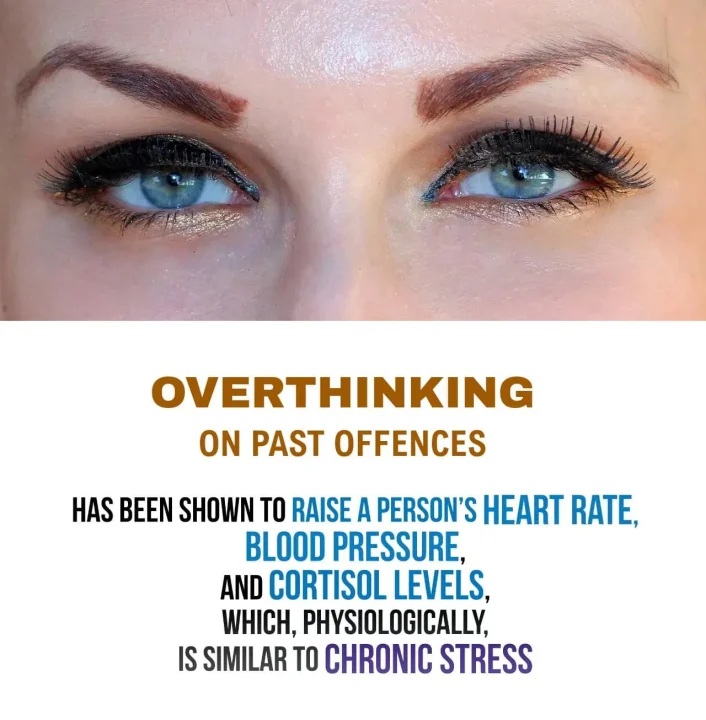Today's Tuesday • 7 mins read
— By Dr. Sandip Roy.
Overthinking is a punishing mental trap.
It exhausts our brains with information overload and loops of negative thoughts. Moreover, an overthinking mind keeps our body in constant stress due to raised levels of cortisol.
Did you know that, compared to men, women ruminate twice as much and are twice as likely to experience depression?
10 Strategies From Science To Stop Overthinking
These neuroscience-backed strategies can help you cut down your overthinking.
1. Distract Yourself with Purpose
When you catch yourself overthinking, deliberately divert your attention to something pleasant, like going for a walk or engaging with an upbeat song or activity.
Science shows women may especially benefit from deliberate distraction. This is because men are known to often engage in distracting behaviors when depressed, while women tend to overthink problems.
- Susan Nolen-Hoeksema’s research found that women are more prone to rumination than men, which may explain the 2:1 ratio of depressed women to depressed men.
- This study found that depressed students who focused on specific geographical locations or objects (like “the size of the Golden Gate Bridge” and the “shape of the African continent”) felt noticeable mood improvement compared to those who focused on their emotions.

2. Embrace Mindfulness to Accept the Past
The hardest thing for overthinkers is usually figuring out how to break their thought loops. They are anxious to stop it, yet helpless to do so.
Mindfulness meditation can help the overthinking mind. Mindfulness is observing and accepting the flow of thoughts without judgment or attachment.
A mindful mind finds it easier to accept the past as unchangeable and let oneself move on. When you practice mindfulness, you stop trying to change or control your thoughts. Instead, you just watch them and let them go.
- A meta-study by clinical psychologist Lilisbeth Perestelo-Perez and colleagues found that Mindfulness-Based Cognitive Therapy (MBCT) significantly reduced overthinking, proving as effective as medication and CBT. Positive effects persisted even a month after the end of MCBT.
3. Cultivate Gratitude for Growth
Gratitude builds a thankful and joyful attitude toward the benefits and gifts received from others and nature (Emmons & Shelton, 2002).
Feeling grateful can help people find new purpose and meaning after a traumatic experience, as well as accept the painful experiences as a part of their existence.
- Gratitude can buffer against stress from intrusive rumination.
- Gratitude can promote deliberate rumination and post-traumatic growth (Wood et al., 2010; Zhou and Wu, 2015; Kim and Lee, 2016).
- Gratitude is a significant predictor of PTG (Jang and Kim, 2017).
4. Build a “Thought Box”
The “Thought Box” method is a simple yet effective strategy to curb overthinking. It involves two steps:
- Physically “box up” intrusive thoughts. Writing down worries or repetitive thoughts on paper and placing them in a box symbolizes containment. That way, you create a ritual to offload mental clutter into a physical box, allowing your mind to rest.
- Fix an allotted time to think about those thoughts. Set aside some time in the day, say 20 minutes, when you allow yourself time to overthink. Set up an alarm on your phone for the end of this interval. During this time, you have the freedom to ruminate on the thoughts in your thought box until the alarm bell rings.
Small addition: Keep a writing pad and pen handy. Note down a few thoughts from the bunch moving through your mind. Don’t stress if you have to write every thought in. Instead, be easy on yourself, and jot down just one or two streams of thought. It will be fine.

5. Act on Solutions, Don’t Dwell
Brain scans show that problem-solving activates distinct neural pathways, reducing anxiety by up to 60% compared to passive worry.
Write down three solutions for any problem and act on one within 24 hours.
For small decisions, set a 60-second timer to decide, training your brain to trust your instincts. Studies show that almost 70% of quick decisions are as effective as those made after lengthy deliberations.
6. Challenge and Reframe Thoughts
Question your troubling thoughts by listing evidence for and against them, creating mental distance to assess their validity.
Research shows that 80% of our 6,000+ daily thoughts carry some bias. Recognizing distortions in our thoughts weakens their hold on us.
For persistent worries, use the two-column method: write worries on the left and facts on the right. This technique helps people see thoughts more clearly.
Studies also suggest that in the long term, nearly 85% of concerns never materialize.
7. Redirect Your Mental Energy
Focused, hands-on activities like painting, gardening, or playing an instrument for 20 minutes can cut rumination by 23% more than passive distractions like scrolling social media.
Physical movement, even a 10-minute walk, boosts BDNF, a protein that fosters new thought patterns, resetting your brain for up to two hours.
For quick relief, try box breathing: inhale for 4 counts, hold for 4, exhale for 4, hold for 4, and repeat four times. Navy SEALs use this to calm overthinking in just two minutes.
8. Track and Schedule Worries
Keep a week-long log to pinpoint your triggers to go into overthinking. Over time, you’ll learn to see these triggers early and take action before you enter the rumination loop.
Count repetitive thoughts with a phone app for three days. It can reveal your top 5–7 worries. For an immediate reset, count backward from 100 by 7s to disrupt thought loops in 30 seconds.
Alternatively, schedule 15 minutes daily for “worry time.” Note down your intrusive thoughts for later review; studies show this can reduce random worrying by 35%.
9. Solve New Problems to Boost Motivation
Tackle a new problem or find innovative solutions to a few problems in your life.
Research suggests that this shift from worry to problem-solving can stabilize mood in individuals prone to rumination.
10. Build Positive Habits
Replace negative thoughts with positive, action-oriented ones daily; after 66 days, this can become automatic, leveraging neuroplasticity to rewire your brain.
A morning gratitude practice (like, naming three positive things in the morning) boosts dopamine and cuts overthinking by 31% in two weeks.
Social support is equally powerful: texting a trusted friend when rumination starts can halve its emotional impact in 15 minutes. Joining group activities, like team sports, further reduces stress hormones by 21%, with the second session feeling 40% easier than the first.

Did Einstein Overthink?
Short answer: Probably yes. Long answer: What scientific thinkers like Albert Einstein, Marie Curie, and Stephen Hawking (who felt humans need more empathy in their lives), did more of was deliberation.
Deliberation is thinking deeply about something over a long time to reach a careful, conscious decision. Deliberate thinkers often collaborate with others to troubleshoot and expand their input-to-output journey.
The keyword here is output.
Thinkers from any field — science, philosophy, politics, business — always think to reach a decision or conclusion.
In contrast, the overthinkers almost always do all the thinking on their own without reaching out for any collaboration. Also, as opposed to thinkers, their thoughts produce no output or action.

How do you know it’s overthinking, not deep thinking? Overthinking does not let you reach any final decision or take any action. Deep thinking does.
Psychology of Overthinking
Experts use the term rumination for overthinking. They define rumination as a persistent, cyclical, and negative thought pattern.
Rumination is of two types: intrusive and deliberate.
- Intrusive rumination. Automatic re-experiencing of thoughts, emotions, and images from specific incidents. Persistent intrusive rumination after a traumatic event can lead to PTSD.
- Deliberate rumination is intentional, focusing on understanding the cause and purpose of an event. It can promote post-traumatic growth (PTG), which leads to a greater appreciation for life, more meaningful relationships, personal strength, and a richer existential and spiritual life.
Health issues associated with overthinking:
- Decreased attention to others or difficulty staying calm
- Slow decision-making and thinking clearly
- Severe stress and anxiety
- Depression
Final Words
Most rumination is about the past. It is worrying when you overthink something before it happens.
Live in the present, let go of the past, and stop worrying about the bad things that might happen in the future.
Seek professional psychological help if you can’t stop overthinking.
√ Also Read: Are You Thinking Or Overthinking: Take The Quiz
√ If you liked it, please spread the word.
» You deserve happiness! Choosing therapy could be your best decision.
...
• Disclosure: Buying via our links earns us a small commission.